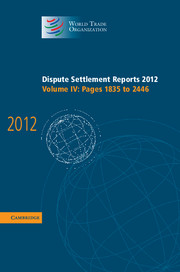Book contents
- Frontmatter
- Table of Contents
- United States - Measures Concerning the Importation, Marketing and Sale of Tuna and Tuna Products (WT/DS381)
- Table of Contents
- CASES CITED IN THIS REPORT
- ABBREVIATIONS USED IN THIS REPORT
- I INTRODUCTION
- II ARGUMENTS OF THE PARTICIPANTS AND THE THIRD PARTICIPANTS
- III ISSUES RAISED ON APPEAL
- IV BACKGROUND AND OVERVIEW OF THE MEASURE AT ISSUE
- V LEGAL CHARACTERIZATION OF THE MEASURE AT ISSUE
- VI ARTICLE 2.1 OF THE TBT AGREEMENT
- VII ARTICLE 2.2 OF THE TBT AGREEMENT
- VIII ARTICLE 2.4 OF THE TBT AGREEMENT
- IX MEXICO'S CLAIMS UNDER ARTICLES I:1 AND III:4 OF THE GATT 1994
- X FINDINGS AND CONCLUSIONS
- ANNEX I Notification of an Appeal by the United States, WT/DS381/10
- ANNEX II Notification of an Other Appeal by Mexico, WT/DS381/11
- Table of Contents
- TABLE OF WTO DISPUTES CITED IN THIS REPORT
- TABLE OF GATT DISPUTES CITED IN THIS REPORT
- LIST OF ABBREVIATIONS
- LIST OF US EXHIBITS CITED IN THIS REPORT
- LIST OF MEXICAN EXHIBITS CITED IN THIS REPORT
- LIST OF AMICUS CURIAE EXHIBITS CITED IN THIS REPORT
- I INTRODUCTION
- II FACTUAL ASPECTS
- III PARTIES' REQUESTS FOR FINDINGS AND RECOMMENDATIONS
- IV ARGUMENTS OF THE PARTIES
- V ARGUMENTS OF THE THIRD PARTIES
- VI INTERIM REVIEW
- VII FINDINGS
- VIII RULINGS AND RECOMMENDATIONS
- Cumulative List of Published Disputes
IX - MEXICO'S CLAIMS UNDER ARTICLES I:1 AND III:4 OF THE GATT 1994
Published online by Cambridge University Press: 13 December 2017
- Frontmatter
- Table of Contents
- United States - Measures Concerning the Importation, Marketing and Sale of Tuna and Tuna Products (WT/DS381)
- Table of Contents
- CASES CITED IN THIS REPORT
- ABBREVIATIONS USED IN THIS REPORT
- I INTRODUCTION
- II ARGUMENTS OF THE PARTICIPANTS AND THE THIRD PARTICIPANTS
- III ISSUES RAISED ON APPEAL
- IV BACKGROUND AND OVERVIEW OF THE MEASURE AT ISSUE
- V LEGAL CHARACTERIZATION OF THE MEASURE AT ISSUE
- VI ARTICLE 2.1 OF THE TBT AGREEMENT
- VII ARTICLE 2.2 OF THE TBT AGREEMENT
- VIII ARTICLE 2.4 OF THE TBT AGREEMENT
- IX MEXICO'S CLAIMS UNDER ARTICLES I:1 AND III:4 OF THE GATT 1994
- X FINDINGS AND CONCLUSIONS
- ANNEX I Notification of an Appeal by the United States, WT/DS381/10
- ANNEX II Notification of an Other Appeal by Mexico, WT/DS381/11
- Table of Contents
- TABLE OF WTO DISPUTES CITED IN THIS REPORT
- TABLE OF GATT DISPUTES CITED IN THIS REPORT
- LIST OF ABBREVIATIONS
- LIST OF US EXHIBITS CITED IN THIS REPORT
- LIST OF MEXICAN EXHIBITS CITED IN THIS REPORT
- LIST OF AMICUS CURIAE EXHIBITS CITED IN THIS REPORT
- I INTRODUCTION
- II FACTUAL ASPECTS
- III PARTIES' REQUESTS FOR FINDINGS AND RECOMMENDATIONS
- IV ARGUMENTS OF THE PARTIES
- V ARGUMENTS OF THE THIRD PARTIES
- VI INTERIM REVIEW
- VII FINDINGS
- VIII RULINGS AND RECOMMENDATIONS
- Cumulative List of Published Disputes
Summary
402. Mexico submits that the Panel erred in exercising judicial economy with respect to Mexico's claims under Articles I and III of the GATT 1994, thereby acting inconsistently with its obligations under Article 11 of the DSU, and requests the Appellate Body to complete the legal analysis by ruling on these claims. The United States counters that the Panel “addressed ‘all aspects of Mexico's claims, including non-discrimination aspects under Article 2.1, and other aspects under Article[s] 2.2 and 2.4’, such that it was not ‘necessary for it to consider separately and additionally Mexico's claims under Articles I:1 and III:4 of the GATT 1994.’” The United States further submits that Mexico has not explained why the use of judicial economy by the Panel is a failure to assist the DSB in making recommendations and rulings that would help settle the dispute.
403. We recall that the principle of judicial economy “allows a panel to refrain from making multiple findings that the same measure is inconsistent with various provisions when a single, or a certain number of findings of inconsistency, would suffice to resolve the dispute.” Consequently, “[a] panel need only address those claims which must be addressed in order to resolve the matter in issue in the dispute.” Nonetheless, the Appellate Body also cautioned that:
[t]he principle of judicial economy has to be applied keeping in mind the aim of the dispute settlement system.
- Type
- Chapter
- Information
- Dispute Settlement Reports 2012 , pp. 2000 - 2001Publisher: Cambridge University PressPrint publication year: 2014



